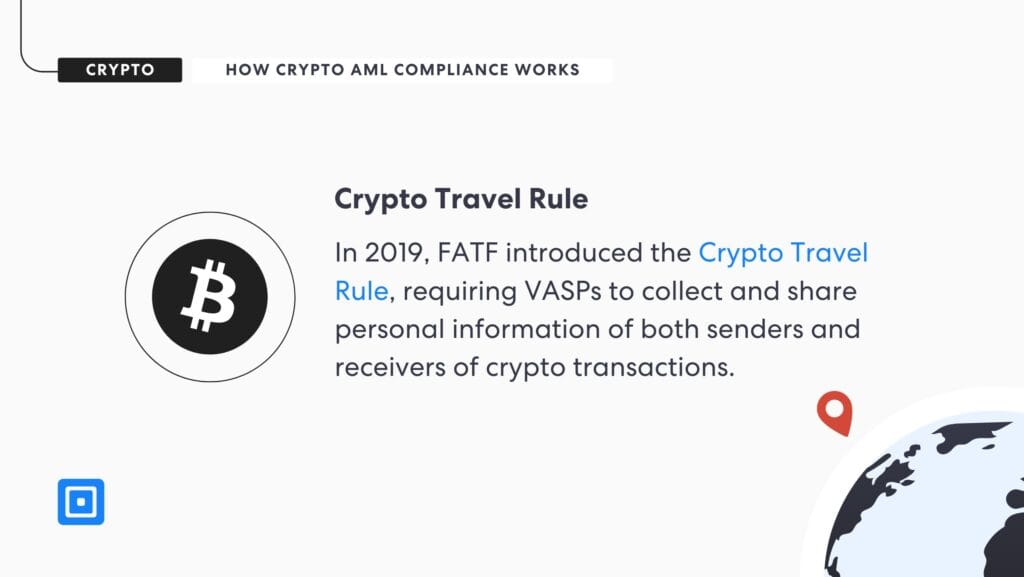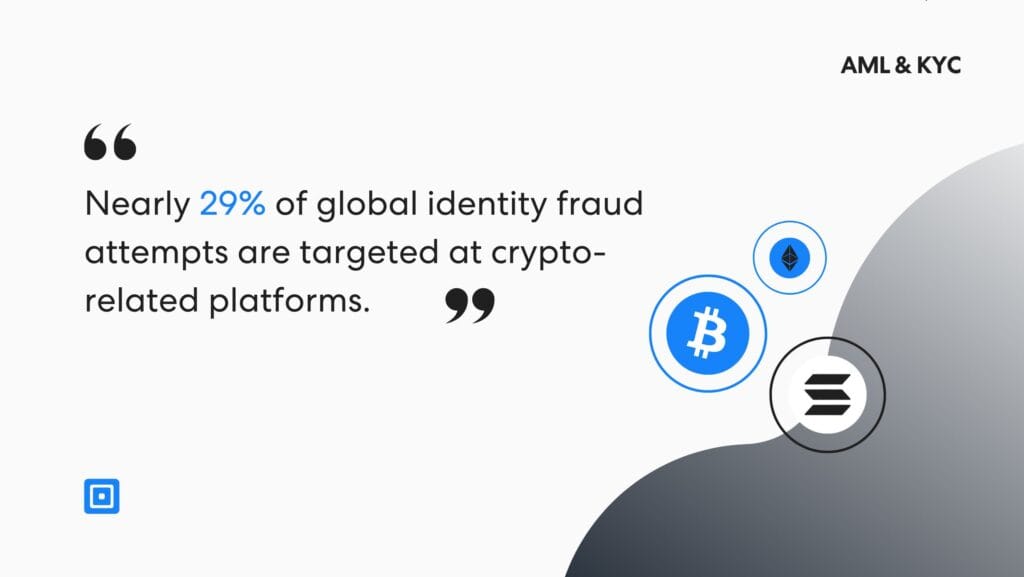Crypto AML compliance has become a central focus for both regulators and crypto businesses to ensure industry transparency and protect the financial system. However, crypto compliance remains a widely debated topic, as issues of money laundering, terrorist financing, and other financial crimes remain prevalent. This has led regulatory authorities to continue to impose stringent crypto KYC and AML measures on virtual asset service providers (VASPs), such as crypto exchanges.
This guide examines the crypto AML regulatory requirements that VASPs must follow according to regional and international policies.
Money Laundering Saturates a Vulnerable Sector
The crypto sector presents fraudsters with the perfect environment to integrate illicit funds, due to the anonymity, global reach and decentralisation of the sector. Transactions are difficult to trace, taking place within networks that are decentralized and therefore increasingly difficult to regulate when compared to traditional banking. Fees for international transfers are relatively low, allowing for easy movement of illicit funds without standard levels of monitoring that are experienced within other sectors.
In 2024, money laundering in crypto encompasses all crime.
The sector’s rapid growth has also, at times, left regulators behind. Difficulty keeping up with new technologies, tokens, and platforms has been experienced by many of these watchdogs. Some specific technologies that have been difficult for regulators to keep up with include privacy coins, such as Monero or Zcash, which were created to enhance user privacy. This has made them increasingly difficult to monitor, creating a viable loophole for fraudsters to exploit.
Since 2019, almost $100 billion in funds have been transferred from known illicit wallets to conversion services – where crypto is converted to fiat currency. The highest amount identified was $30 billion in 2022.
The staggering figure of nearly $100 billion transferred from known illicit wallets since 2019 underscores the urgent need for enhanced regulatory measures in the crypto sector. The reliance on conversion services to transform crypto into fiat currency provides a critical vulnerability that fraudsters exploit, taking advantage of the relatively low oversight in these transactions.

The Rise of Regulations for Crypto AML Compliance
Anti-money laundering (AML) and Know Your Customer (KYC) regulations have long been present in Traditional Financial (TradFi) institutions. These regulations are designed to accurately identify users in the financial system and monitor their status. Doing this gives firms the best opportunity to prevent money laundering, ensuring that financial institutions are not being exploited to launder illicit funds or contribute to malicious activities.
It is no surprise, then, that a financial ecosystem that hinges on decentralization has warranted robust AML legislation as well. Initially, the lack of regulatory oversight in the crypto industry created opportunities for illicit activities such as money laundering and terrorist financing. This prompted the Financial Action Task Force (FATF) to call for tighter regulations, leading to the introduction of new comprehensive crypto AML regulations, such as the travel rule.
In 2019, FATF introduced the crypto travel rule, requiring VASPs to collect and share personal information of both senders and receivers of crypto transactions. The rule helps authorities monitor transactions, detect suspicious movements of money, and curb the flow of illicit funds through cryptocurrencies. For more information on FATF’s crypto travel rule, read The Crypto Travel Rule.

Key Crypto AML Compliance Procedures
For crypto firms, including cryptocurrency exchanges and crypto companies, adhering to AML compliance means implementing several key measures. These include:
Crypto KYC
A cornerstone of AML compliance, the crypto KYC process requires crypto businesses to verify the identities of their customers. The customer identification program (CIP) is designed to ensure that companies can identify individuals conducting transactions.
Non-KYC exchanges are more vulnerable to being shut down or blacklisted by regulatory authorities, potentially leading to loss of access to funds.
Lack of adequate KYC measures leaves crypto exchanges vulnerable to being blacklisted or even shut down. Historical examples of this include:
- Derbit (2020): Derbit was forced to leave the Netherlands in 2020 after not complying with mandates of the Fifth Anti-Money Laundering Directive (5AMLD).
- BTC-e (2017): BTC-e was infamously shut down by U.S. authorities for lack of AML infrastrucutre.
- BitMEX (2020): While BitMEX was not completely shut down, the exchange faced significant legal difficulty for failing to implement sufficient KYC/AML procedures. U.S. regulators charged BitMEX’s founders with violating anti-money laundering rules.
In 2022, after admitting guilt to AML violations in a case brought by the US Commodity Futures Trading Commission, the three founders were collectively ordered to pay a $30 million civil penalty.
In 2022, after admitting to AML violations in a case brought by the U.S. Commodity Futures Trading Commission, the three BitMEX founders were collectively fined $30 million in civil penalties and received probation sentences. BitMEX’s guilty plea underscores the critical need for crypto exchanges to comply with U.S. financial regulations to maintain market integrity.
KYC processes involve customer identification and screening for politically exposed persons (PEPs) to mitigate terrorist financing risks. Learn more about the KYC process in the crypto industry by reading How Crypto KYC Regulations Safeguard the Industry.
Transaction Screening and Monitoring
Effective transaction monitoring is essential for crypto and compliance. Crypto businesses must set up systems to monitor and flag suspicious transactions. This includes identifying patterns of behaviour that suggest potential money laundering or other financial crime. Such systems allow firms to report suspicious activity to the relevant authorities.
Ongoing Monitoring
Ongoing Monitoring is an essential component of AML programs, ongoing monitoring ensures that firms continuously track customers and virtual currency transactions. This helps crypto exchanges spot suspicious activity that may occur even after the initial KYC screening.

When crypto transactions trigger red flags, companies are required to report them to the appropriate agencies. This process of reporting suspicious activity ensures that relevant law enforcement agencies can take timely action against individuals seeking to use crypto assets for money laundering purposes.
Challenges and Opportunities in Crypto AML Compliance
Implementing crypto AML measures poses significant challenges for crypto firms and regulators. Ultimately, crypto regulation is looked at from two perspectives.
- On-chain regulation
- Off-chain regulation
Centralized Exchanges (CEXs) operate in a similar way to TradFi trading platforms, where an institution acts as a custodian on behalf of its users and holds crypto assets off-chain. These trading platforms then implement market-making mechanisms and other key trading infrastructures to facilitate trading actions and price movements.
Decentralized Exchanges (DEXs) are on-chain utilities where users buy and sell cryptocurrencies without an intermediary (i.e., a CEX). These actions are facilitated through smart contracts and are fulfilled on the blockchain. The decentralized and anonymous nature of these cryptocurrency transactions makes decentralized applications very challenging to regulate.
However, it is not just the industry itself that makes it hard to regulate. The digital asset space is an emerging market, meaning that there is a significant lack of standardization across jurisdictions, making it challenging for firms to ensure compliance.
Having said this, regulatory pressure is increasing, and major authorities are beginning to crack down on the application of crypto regulation with more vigor. This has led to the development of innovative solutions, such as cryptocurrency transaction monitoring tools, automated crypto KYC and AML processes, and on-chain analytics tools.
These tools help crypto businesses meet their regulatory requirements and protect the financial system from exploitation by criminals. Furthermore, financial institutions are now working alongside crypto businesses to develop integrated AML programs that align with both traditional and digital financial ecosystems.
The Future of Crypto AML Compliance
Looking ahead, crypto AML compliance will only become more critical as the crypto industry matures. The ongoing dialogue between regulators and crypto firms will shape the future of AML compliance in the space. As AML measures become more sophisticated, businesses will need to leverage technology to meet AML requirements while maintaining customer privacy and operational efficiency.
Furthermore, the role of regulatory authorities such as FATF, along with increased cooperation between traditional financial institutions and crypto exchanges, will be key in ensuring a secure, transparent, and compliant crypto ecosystem.
By adopting appropriate measures, such as enhanced KYC programs and advanced transaction monitoring systems, the industry can not only meet AML compliance standards but also foster trust and legitimacy in the eyes of both regulators and consumers.
Crypto compliance in the virtual assets space is an essential component in the fight against money laundering and terrorist financing. As AML regulations continue to evolve, crypto businesses must stay proactive in implementing AML procedures, ensuring that they are not only complying with the law but also playing an active role in combating money laundering and safeguarding the integrity of the global financial system. The future of the crypto market depends on it.
For more information on how to fortify your crypto business with the right AML, KYC and IDV infrastructure, contact one of ComplyCube’s compliance experts.




